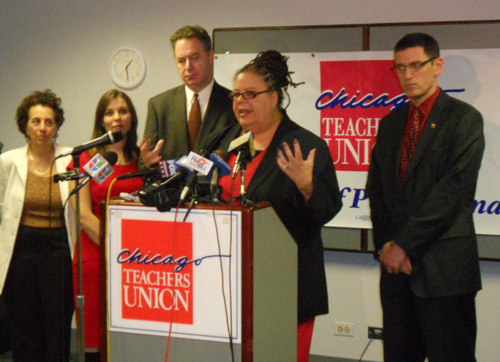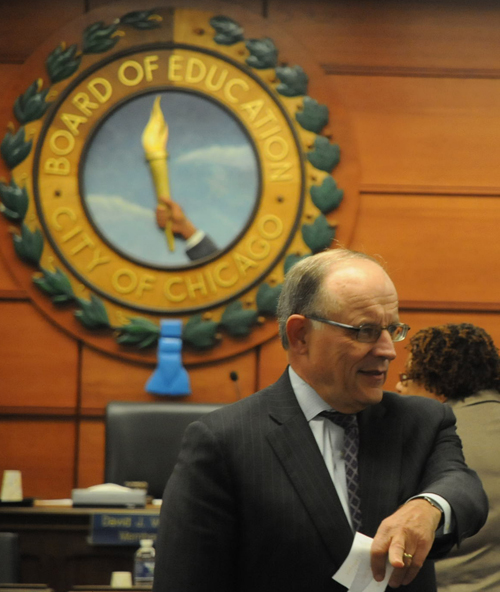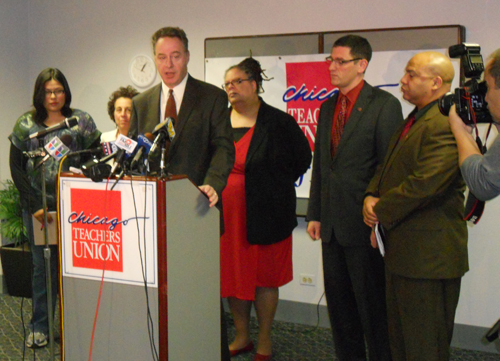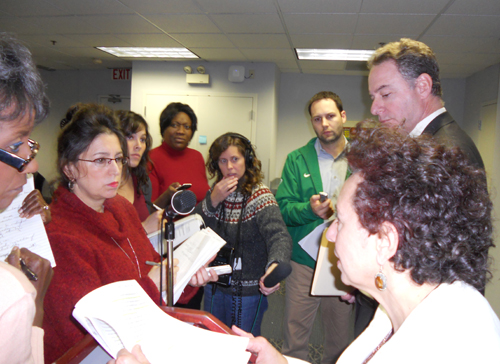'If permitted to pursue this conduct, the Chicago Board of Education would end collective bargaining as we know it in Illinois' (Karen Lewis)... Labor Board Approves Injunction to Stop CPS’s Violations in 'Waiver' votes
In a unanimous vote the five-member Illinois Education Labor Relations Board (IELRB) approved the Chicago Teachers Union claims for injunctive relief to stop the Chicago Board of Educations unilateral imposing of a longer school day outside if the collective bargaining process. The issue in question is the school board's push to forcibly institute a "Longer School Day" under the command of Mayor Rahm Emanuel and his appointees at the Chicago Board of Education. The decision of the IELRB was announced on October 20, 2011. Previously, the Chicago Teachers Union, on October 14, had announced the ruling of the head of the IELRB. (Some press reported and the editorial in the Chicago Tribune distorted what had happened; the October 20 announcement makes the final reality clear).
 Chicago Teachers Union President Karen Lewis tried at an October 14 press conference to explain the union's victory in the Illinois Labor Relations Board (IELRB) complaint against the Chicago Public Schools "waiver" activities. Left to right above: Attorney Robin Potter, CTU Financial Secretary Kristine Mayle, Attorney Robert Bloch, CTU President Karen Lewis, CTU Vice President Jesse Sharkey. Substance photo by George N. Schmidt.The IELRB is the state agency administering the Illinois Education Labor Relations Act, which establishes the right of educational employees to organize and bargain collectively. Labor law forbids any attempt by an employer to go behind the back of the recognized collective bargaining agent. The IELRB in effect held that the campaign, in August and September, by the Chicago Public Schools to get teachers and other union staff at individual schools to vote in favor of the "Longer School Day" as proposed by CPS was a violation (see below for the complete decision, itemized, or the earlier report at www.substancenews.net).
Chicago Teachers Union President Karen Lewis tried at an October 14 press conference to explain the union's victory in the Illinois Labor Relations Board (IELRB) complaint against the Chicago Public Schools "waiver" activities. Left to right above: Attorney Robin Potter, CTU Financial Secretary Kristine Mayle, Attorney Robert Bloch, CTU President Karen Lewis, CTU Vice President Jesse Sharkey. Substance photo by George N. Schmidt.The IELRB is the state agency administering the Illinois Education Labor Relations Act, which establishes the right of educational employees to organize and bargain collectively. Labor law forbids any attempt by an employer to go behind the back of the recognized collective bargaining agent. The IELRB in effect held that the campaign, in August and September, by the Chicago Public Schools to get teachers and other union staff at individual schools to vote in favor of the "Longer School Day" as proposed by CPS was a violation (see below for the complete decision, itemized, or the earlier report at www.substancenews.net).
The IELRB ruling now goes to the Illinois attorney general's office which will petition a circuit court judge for injunction.
“This is a victory for labor and a victory for the law,” said CTU President Karen GJ Lewis in a press statement issued by the union on October 20. “CPS’ scheme to get schools to convert to a longer school day this year is illegal and today the IELRB found the Chicago Board of Education will irreparably injure labor relations unless it is stopped from implementing its scheme. Today’s ruling says the Chicago Board of Education cannot break the law no matter what its intentions are.
“We have repeatedly asked them to settle this case; to sit down and discuss this process; and to help us plan for a longer, better school day next year when this program goes system wide for the 2012 - 2013 school year,” she continued. “Instead they engaged in illegal, immoral behavior that threatened the future of collective bargaining and of our union. I commend the teachers and school employees who took a stand against this behavior. Today, organized labor won.”
The collective bargaining issues facing the Chicago Teachers Union on October 20 were also on display indirectly when the press interviewed both sides following the unanimous IELRB ruling. How much money is CPS, which claims to be broke, willing to pay for some of the most expensive "labor relations" lawyers in Chicago?
The Board's outside attorney, James Fanczek, impatiently told reporters after the ruling was handed down that the Board still disagreed with the ruling. Franczek, who is paid more than $1 million per year by the Chicago Board of Education as an outside lawyer (despite the Board's having a law department with more than 70 staff that wasn't cut this year) then left the building after warning the press that CPS would continue to litigate the issue. Franczek is likely to continue to be the Board lawyer leading contract negotiations with the Chicago Teachers Union in the months ahead.
The taxpayers compensate Franczek well for his work. Since January 1, 2011, during a time when CPS has been claiming that it is facing a "fiscal emergency," the Chicago Board of Education has voted to pay Franczek's firm a total of $1.12 million. On March 23, 2011, the Board voted to pay Franczek's firm $520,000. On July 27, 2011, six weeks after voting (at a special meeting on June 15) that it did not have the money to fund the raises for the unions representing the workers in the schools, the Chicago Board of Education voted to pay Franczek's firm an additional $600,000. The Board Reports to pay the $1.12 million to Franczek can be fond on the CPS website, under the "Action Agenda" of each Board meeting.
 Earlier in the Emanuel administration, CPS attorney James Franczek gave a "Rahm Style" salute to Substance following the vote of the Chicago Board of Education on June 15, 2011 that the Board faced a huge "deficit" and could not therefore afford to pay the four percent raises to the Board's unionized workers in the fifth year of the negotiated contracts. Between January 1, 2011, and October 20, 2011, the same Board of Education voted to pay Franczek's law firm, Franczek Radelet, $1,120,000 for outside legal services, during a time when the Board also voted to expand its own enormous Law Department. Substance photo by George N. Schmidt.Franczek was the lawyer who advised the Board on June 15, 2011 how to frame the question when the Board, newly appointed by Rahm Emanuel, voted that it faced an enormous "deficit" and therefore did not have the money necessary to pay for the workers' raise in the fifth year of the negotiated union contracts.
Earlier in the Emanuel administration, CPS attorney James Franczek gave a "Rahm Style" salute to Substance following the vote of the Chicago Board of Education on June 15, 2011 that the Board faced a huge "deficit" and could not therefore afford to pay the four percent raises to the Board's unionized workers in the fifth year of the negotiated contracts. Between January 1, 2011, and October 20, 2011, the same Board of Education voted to pay Franczek's law firm, Franczek Radelet, $1,120,000 for outside legal services, during a time when the Board also voted to expand its own enormous Law Department. Substance photo by George N. Schmidt.Franczek was the lawyer who advised the Board on June 15, 2011 how to frame the question when the Board, newly appointed by Rahm Emanuel, voted that it faced an enormous "deficit" and therefore did not have the money necessary to pay for the workers' raise in the fifth year of the negotiated union contracts.
Despite the million dollars in legal work done for CPS, CTU lawyers prevailed. In oral arguments Robert Bloch, lead attorney for the Union, said the argument was clear that the complaint was not about the longer school day, but the Board of Education’s “threatening and inducing teachers to supplant their labor contract with a new school day and new compensation terms, CBE sought to make the CTU irrelevant as the teachers’ collective bargaining representative.”
 At the October 14, 2011 press conference, attorney Robert Bloch (above at podium) tried patiently to explain to reporters that the IELRB decision announced that day was a victory for the union's position in the fight over the September 2011 waiver votes. Some members of the corporate media were unable to report the facts, and the Chicago Tribune ignored them. Substance photo by George N. Schmidt.“If permitted to pursue this conduct, the CBE would end collective bargaining as we know it in Illinois," Bloch continued. "We submit that the CBE’s attempt to re-write any term of the labor contract at any school will destroy the system of collective bargaining enshrined in Educational Labor Relations Act and make a mockery of the rights enjoyed by teachers and their chosen collective bargaining representative,” Bloch went on to say in his argument.
At the October 14, 2011 press conference, attorney Robert Bloch (above at podium) tried patiently to explain to reporters that the IELRB decision announced that day was a victory for the union's position in the fight over the September 2011 waiver votes. Some members of the corporate media were unable to report the facts, and the Chicago Tribune ignored them. Substance photo by George N. Schmidt.“If permitted to pursue this conduct, the CBE would end collective bargaining as we know it in Illinois," Bloch continued. "We submit that the CBE’s attempt to re-write any term of the labor contract at any school will destroy the system of collective bargaining enshrined in Educational Labor Relations Act and make a mockery of the rights enjoyed by teachers and their chosen collective bargaining representative,” Bloch went on to say in his argument.
The complete narrative follows:
The Chicago Teachers Union’s charge was filed because of a broadside attack by the Chicago Board of Education [below, CBE] on the collective bargaining process, which literally threatens the future of collective bargaining in Chicago.
The CTU’s labor contract with the CBE, which expires on June 30, 2012 sets the length of the school day and year, and of course, sets the salaries for approximately 32,000 CTU-represented employees.
On August 24, 2011, the CBE suddenly proposed to the Union that it agree to reopen and modify its labor contract to increase length of elementary school day by 90 minutes.
CBE said this would result in an increase of work hours by up to 21%. In exchange, CBE offered to raise teacher base salaries by 2%.
In fact, CBE also asked that school year be lengthened by up to 10 days with no additional compensation.
 Attempts at explanations of the ruling continued after Karen Lewis left the October 14 press conference. Above, CTU attorneys Robert Bloch and Robin Potter go over in detail the decision. Substance photo by George N. Schmidt.The Union politely declined to reopen its labor agreement, believing it had the right to rely on terms mutually agreed and codified in the labor contract.
Attempts at explanations of the ruling continued after Karen Lewis left the October 14 press conference. Above, CTU attorneys Robert Bloch and Robin Potter go over in detail the decision. Substance photo by George N. Schmidt.The Union politely declined to reopen its labor agreement, believing it had the right to rely on terms mutually agreed and codified in the labor contract.
But the SCHOOL BOARD wouldn’t take no for an answer.
Without prior notice to Union, CBE embarked on a campaign to impose a 90-minute extension of the school day by conducting votes at elementary schools. It did so in a coordinated effort to get all schools across the city to accept it, one school at a time.
CBE offered teachers certain inducements to vote for the extended school day. Instead of an increase to the base wage of 2% it offered a 2% lump sum payment and certain unspecified goodies from a 1-time $150,000 payment to each school, which to some teachers would include Ipads, extra days off, promise of hiring more teachers.
To increase the odds that its proposition would succeed, CBE administrators and many of the school principals that sponsored the votes engaged in a campaign of coercion and intimidation.
As alleged in the complaint:
- Threatened teachers with loss of jobs & possible school closing if didn’t approve the change
- Discouraged teachers from speaking with the CTU, including by expelling CTU representatives from schools & disrupting Union meetings about the votes
- Interrogated teachers about their Union contacts
& as alleged in amended complaint issued yesterday,
- Directed teachers to preserve their communications from CTU for review by management
By threatening and inducing teachers to supplant their labor contract with a new school day and new compensation terms, CBE sought to make the CTU irrelevant as the teachers’ collective bargaining representative.
And the CBE has made clear that it intends to keep at it, to ride roughshod over the labor contract and collective bargaining rights at every elementary school in the city, and unless the IELRB seeks injunctive relief, it might succeed before a final determination is made on the merits of the complaint.
The CBE offers 2 principal defenses in support of its actions.
First, that it is allowed to override the contract because length of school day is now a permissive subject of bargaining under Sec. 4.5 of the Act.
Second, it is allowed to override the contract because of waiver provisions in the Illinois School Code and Appendix C to the labor contract.
These defenses are meritless, but one critical fact must be kept in mind:
CBE has offered no evidence to refute its unlawful threats and coercion of teachers in the exercise of their rights.
Even if their defenses were fully merited – which they are not – the CBE may not threaten, coerce, interrogate, and surveille teachers in order to force them to waive rights under their labor contract. Nothing in the Act or School Code allows the Board to use unlawful means to carry out its policies.
Regarding its first defense — that CBE can implement changes in length of school day without bargaining because new revisions to Sec. 4.5 render it a permissive subject — CBE overlooks or ignores an obvious fact: that it entered into a binding labor contract with the CTU covering this subject, and it is not free to violate the labor contract, even if the contract terms covers a permissive subject. While the school board may lawfully refuse to bargain a permissive subject, having both bargained the subject and entered into a binding labor contract setting those terms, it cannot repudiate the contract at any time it chooses. Proof that CBE knows better is its own proposal to reopen the contract in order to modify it with a longer school day and year. It knew it could not ignore the contract provisions. It was just unhappy that the Union declined to reopen it.
Regarding its second defense, CBE is correct that Illinois School Code Section 34-8.1a permits waivers of contract terms. But waivers are just that: waivers of restrictions imposed by contract. But CBE did far more than just seek a waiver here: It renegotiated core terms of the labor contract, and is seeking to do so on a district-wide basis.
Appendix C arguably allows more: it permits proposals that would require waivers, but Appendix C has never been used to make district-wide change not authorized in the labor contract, or to renegotiate compensation, and further it imposes strict procedural requirements that the CBE failed to observe here.
In reality, CBE’s defense here is about more than length of school day. It claims there is no limit on what may be waived or changed. Thus, under its logic, the CBE could literally re-write every provision of the labor contract at a principal’s or the administration’s behest, substituting any term, and doing so on a district-wide basis as long as it implements on a school by school basis.
In sum, it would emasculate the CTU as a bargaining representative.
The labor contract would be nothing more than recommended terms of employment because any principal can re-write entire contract if he or she induces 51% of local school staff to sign off.
Until today, the CBE never claimed to have had this power. As far as the CBE seeks to push the envelope now, the CBE does not assert that it has even attempted to exercise this kind of unfettered, raw power before.
If permitted to pursue this conduct, the CBE would end collective bargaining as we know it in Illinois. We submit that the CBE’s attempt to re-write any term of the labor contract at any school will destroy the system of collective bargaining enshrined in Educational Labor Relations Act and make a mockery of the rights enjoyed by teachers and their chosen collective bargaining representative. Add to it the CBE’s evident intent to use whatever means a principal has at hand to force teachers to accept changes to the labor contract, and it would thrust a dagger into the heart of collective bargaining, from which it may never recover.
The CBE has made clear that it has no intention of stopping at the 13 schools where it has already succeeded. Unless restrained, it will continue to re-write the terms and conditions of employment at 450 or more elementary schools well before the date this matter is finally adjudicated, including no doubt an appeal to the state courts upon any finding of unlawful conduct by this agency.
Accordingly, we respectfully ask the IELRB to seek preliminary injunctive relief to restore the status quo ante and to bar the CBE from threatening, interrogating, surveilling and otherwise coercing its employees, from bypassing the Union and dealing directly with its employees, and from repudiating its labor contract pending the completion of these proceedings.
As we explained in our brief, injunctive relief is required for all the reasons recognized under the Act.
First, the Board must preserve the basic remedial purposes of the Act
The CBE’s actions here are egregious, and they are even more serious because the parties are about to commence negotiations for a new labor contract, when current contract expires in about 8 months.
The CBE plainly is attempting to influence bargaining by compelling teachers to accept its restructuring of the contract even before negotiations have commenced. Undoubtedly seeks to make teachers feel they have no choice, even over those matters that are mandatory bargaining subjects such as scheduling and compensation.
Second, the Public Interest Adversely affected by a continuing violation
The education of children in the nation’s third largest school system is matter of vital public interest, and it will be seriously disrupted by efforts to undermine CTU’s role as collective bargaining representative on behalf of CPS’s teachers
No doubt CBE will argue that it is acting in the public interest by increasing the length of the school day – that it is attempting to improve public education by increasing the amount of time students spend at school.
To this we must respond: Even the best ideas do not excuse unlawful conduct. There is a lawful way to do things and an unlawful one
Threatening teachers to get their consent
Undermining collective will by isolating teachers within each school
Repudiating provisions of the labor contract
Undermining the Union’s role as collective bargaining representative
Is not the way to do it
Third, The Status Quo Ante must immediately be restored,
For the reasons already discussed.
Fourth, Ordinary IELRB remedies are inadequate
Board has already ruled in Crete-Monee School District 201, 19 PERI ¶145 (IELRB 2003) and Cairo School District 1, 23 PERI ¶ 136 (IELRB 2007) that unlawfully forcing teachers to perform work that do not wish to perform presents a harm that requires injunctive relief because traditional remedies simply cannot remedy it.
That is plainly the case here. No way to get back the additional time teachers are unlawfully required to work
Further, no damages will restore injury done here to the collective bargaining process.
Finally, Irreparable harm will result without preliminary injunctive relief
As the appellate court explained in AFSCME v Holsapple, 6 PERI ¶ 4026, 201 IA 3 1040 (4th dist 1990) “irreparable harm” does not mean injury that is beyond repair or compensation in damages, but rather, means injury of a “continuing nature”
CBE’s conduct here is admittedly continuing. CBE intends to keep forcing teachers to adopt longer school day until it is forced to stop.
We respectfully ask the IELRB seek prelim injunctive relief directing it to stop.
CTU press statement follows below here:
Labor Board votes 5-0 to seek injunction blocking unlawful implementation of ‘longer school day’
Today, the Illinois Education Labor Relations Board (IELRB) struck a blow against union-busting and employee coercion and intimidation by unanimously voting to seek injunctive relief against the Chicago Board of Education’s illegal push for a longer school day. Members of the labor board voted 5-0 to seek an injunction blocking the program from taking effect this year. If granted, nine schools that have currently extended their school day will revert to their previous schedule as outlined in the CTU contract and no other elementary school can amend its school hours.
Click here to download the one-hour audio recording of the Oct. 20, 2011 hearing held by the IELRB. The recording begins with oral arguments presented by Chicago Teachers Union’s attorney Robert Bloch.
CTU Attorney Robert Bloch’s written statement can be downloaded [from the CTU website, www.ceunet.com].
The IELRB is the state agency administering the Illinois Education Labor Relations Act, which establishes the right of educational employees to organize and bargain collectively. The IELRB ruling now goes to the Illinois attorney general's office which will petition a circuit court judge for injunction.
“This is a victory for labor and a victory for the law,” said CTU President Karen GJ Lewis. “CPS’ scheme to get schools to convert to a longer school day this year is illegal and today the IELRB found the CBE will irreparably injure labor relations unless it is stopped from implementing its scheme. Today’s ruling says the CBE cannot break the law no matter what its intentions are.
Comments:
By: Jay Rehak
IELRB ruling ample proof of the value of Union dues!
I was heartened to see the IELRB actually did the right thing in this case. There seems to be little doubt that the longer school day concept is ill conceived and served as an attempt to undermine collective bargaining. I am impressed with the work of our lawyers and Union leaders in this important victory.
I hope the courts don't politicize the issue and overturn the IELRB's ruling.
The facts seem clear enough, and the ruling is very clear. There is a right way and a wrong way to implement work rule changes.
Here's a great example of why we pay our Union dues!


By: Bob Busch
Lawyers
Well Done